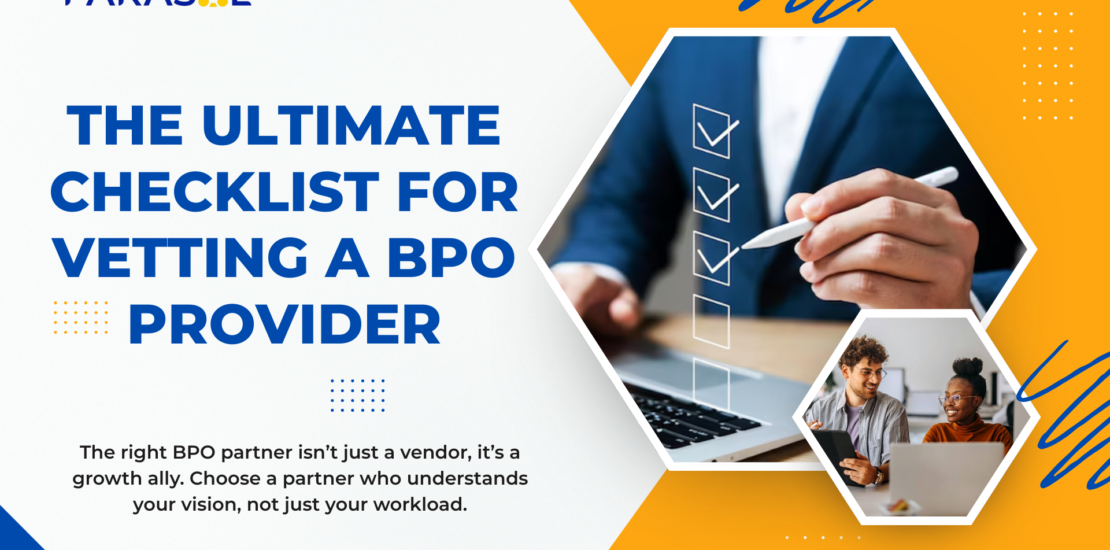The Ultimate Checklist for Vetting a BPO Provider
- October 13, 2025
- Posted by: parasolbpo
- Category: Talent Outsourcing

In today’s competitive business environment, outsourcing is no longer just a cost-saving tactic, it’s a strategic move for scalability, efficiency, and long-term growth. Partnering with a Business Process Outsourcing (BPO) provider can help your company streamline operations, reduce overhead, and stay focused on what truly matters: your core business.
But not all BPO providers are created equal. The success or failure of an outsourcing partnership often depends on how thoroughly you vet your potential partner. Rushing into a decision can lead to communication gaps, quality issues, and even reputational damage. A careful, structured approach, on the other hand, can help you find a provider that aligns perfectly with your business goals and values.
Here’s a detailed guide, the ultimate checklist, to help you make an informed, strategic decision when selecting your BPO partner.
Define Your Goals and Objectives
Before you begin the search, you need to have absolute clarity on why you’re outsourcing and what you hope to achieve. This step is often overlooked, but it forms the foundation for everything that follows. Are you looking to cut costs, enhance service quality, scale faster, or gain access to specialized talent?
Clearly defining your objectives allows you to identify which processes to outsource and what kind of expertise your provider must have. For instance, outsourcing customer support will require a partner skilled in communication and CRM management, while outsourcing back-office functions demands accuracy, security, and process discipline.

Looking for Relevant Industry Experience
Experience matters greatly when choosing a BPO partner. A provider with a strong background in your industry will understand your challenges, compliance needs, and customer expectations better. They’ll also adapt faster to your processes, reducing the learning curve.
Ask questions like:
- How long has the company been operating?
- Have they worked with businesses similar to yours?
- Can they share case studies or client success stories?
An experienced provider brings not just technical skill but also operational insights and best practices that can enhance your efficiency from day one.
Evaluate Technology and Infrastructure
In today’s digital-first world, technology is the backbone of BPO operations. The provider you choose should have reliable, up-to-date systems and infrastructure to support your business needs. This includes communication tools, data management systems, CRM platforms, and cybersecurity frameworks.
Find out what tools and technologies they use, how they integrate with your existing systems, and whether they have backup and redundancy plans in place. Their ability to leverage automation, analytics, and AI can also be a major advantage, as it often translates to better accuracy, faster turnaround, and lower costs.

Check Data Security and Compliance Standards
Outsourcing means entrusting another company with your data, often including customer information, financial details, or intellectual property. This makes security and compliance non-negotiable.
Your BPO provider should demonstrate compliance with global standards like GDPR, HIPAA, or PCI DSS, depending on your industry. They should also have clear policies on data protection, access control, encryption, and breach response. Don’t hesitate to request documentation or certifications to verify their claims. A partner who prioritizes security helps you safeguard your reputation and maintain customer trust.
Assess Quality Control and Performance Metrics
Quality assurance is one of the strongest indicators of a BPO provider’s professionalism. Ask how they measure performance, what benchmarks they use, and how frequently they share progress reports.
Common metrics include:
- Customer satisfaction (CSAT)
- Response and resolution times
- Error or accuracy rates
- Service Level Agreement (SLA) adherence
A good BPO should have systems in place for continuous monitoring, feedback collection, and process improvement. The more transparent and data-driven their reporting, the easier it will be for you to evaluate their performance.

Analyze Talent and Training Programs
Behind every successful outsourcing partnership is a team of skilled, well-trained professionals. It’s essential to understand how your potential BPO provider recruits, trains, and manages its workforce.
Look into their hiring standards and how they onboard new team members. Ask about ongoing training programs, performance evaluations, and employee retention rates. A provider that invests in its people will deliver consistent results, maintain service quality, and represent your brand effectively.
Examine Communication and Collaboration Practices
Effective communication is the cornerstone of any outsourcing relationship. Poor communication often leads to misunderstandings, inefficiency, and frustration.
Before signing any contract, clarify how communication will work day-to-day. Will you have a dedicated account manager or point of contact? How often will meetings and progress reviews occur? What tools will be used for collaboration?
A reliable BPO provider should establish clear communication channels, provide real-time visibility into operations, and respond promptly to your concerns.

Ask for Client References and Case Studies
No matter how impressive a provider’s proposal looks, real-world feedback is invaluable. Ask for references from their current or past clients, ideally those in similar industries or service areas.
Speaking directly to other clients can give you honest insights into how the BPO handles challenges, maintains consistency, and manages client relationships. Reviewing published case studies or testimonials can also help you gauge their reliability, flexibility, and performance track record.
Evaluate Pricing and Transparency
Cost is often a driving factor behind outsourcing decisions, but the cheapest option isn’t always the best. Focus on value, not just price.
Make sure the provider’s pricing model is clear and transparent. Understand whether it’s per-hour, per-project, or performance-based. Ask about additional fees or potential costs for scaling up or customizing services. Transparency in pricing reflects honesty in partnership, and helps you avoid surprises down the line.
When assessing cost, weigh it against quality, expertise, and reliability. A slightly higher investment in the right partner can yield far greater returns in the long run.

Run a Pilot Project before Full Implementation
Before committing to a long-term contract, consider running a pilot project. A short-term trial helps you evaluate the provider’s performance, communication efficiency, and ability to align with your brand values.
During this phase, observe how quickly they adapt to your processes, how effectively they manage feedback, and whether they deliver on agreed metrics. A successful pilot gives you the confidence to proceed, while any red flags will be easier to identify and address early on.
Conclusion
Vetting a BPO provider is more than a procurement exercise, it’s a strategic decision that can shape your company’s future growth. The right provider becomes an extension of your team, helping you deliver exceptional service, scale efficiently, and maintain a competitive edge.
By following this checklist, you’ll move beyond surface-level promises and uncover the real capabilities of your potential partners. Take the time to evaluate thoroughly, communicate clearly, and choose a BPO that aligns with your goals and values. The result is a long-term partnership built on trust, quality, and shared success. Ready to scale smarter, not harder? Book your Free Consultation today.
BPO Outsourcing BusinessGrowth CustomerSupport BusinessStrategy ScalableGrowth Efficiency EntrepreneurLife Teamwork ParasolBPO


